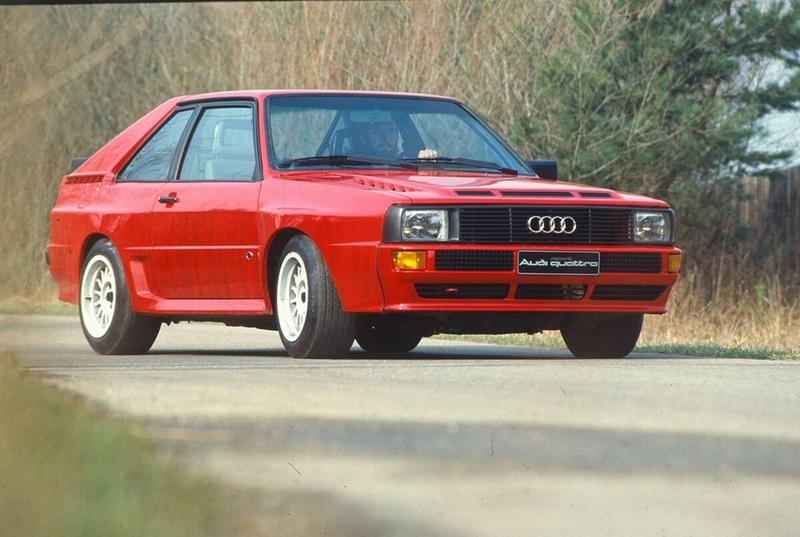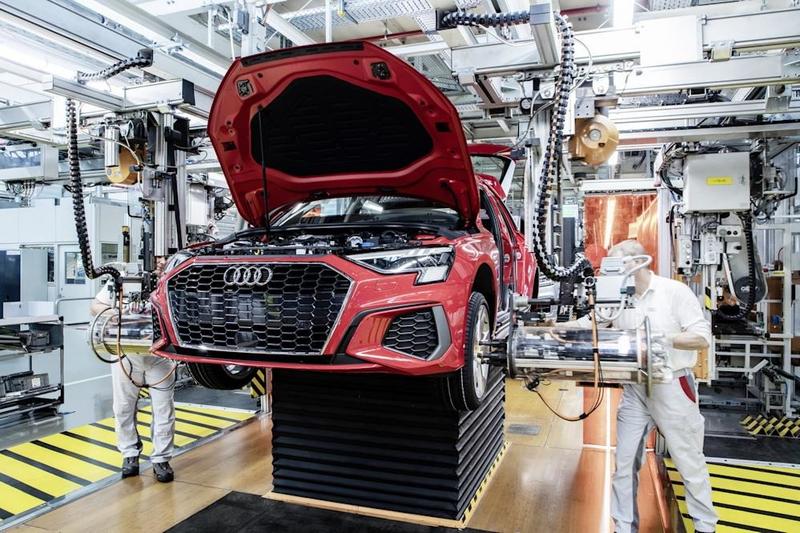Company focuses on new era of mobility following decades of motor sport success
 The Audi 100 CS quattro drives up the 37.5-degree incline of the ski-jump slope in Kaipola, Finland, in 1986. (PHOTO PROVIDED TO CHINA DAILY)
The Audi 100 CS quattro drives up the 37.5-degree incline of the ski-jump slope in Kaipola, Finland, in 1986. (PHOTO PROVIDED TO CHINA DAILY)
Not many carmakers' slogans are as popular and long-lasting as Audi's Vorsprung durch Technik, which translates as Progress through Technology.
Now celebrating its 50th anniversary, the slogan has become synonymous with the company for its car owners and fans around the world.
We are redefining advancement and focusing on sustainability, digitalization and electrification. It’s about making a contribution to a livable future with meaningful technology
Hildegard Wortmann, member of the board of management of Audi AG for sales and marketing
For the Ingolstadt-headquartered company, the slogan-first put into use in 1971-has been a long-standing source of inspiration to develop better vehicles and a lighthouse for it to maneuver nimbly toward success in different eras of mobility.
An employee called Hans Bauer came up with the slogan in 1970 to communicate Audi's technological diversity as a competitive advantage as a result of Auto Union GmbH's merger with Neckarsulmer NSU Motorenwerke one year earlier.
The new company, which was called Audi NSU Auto Union, had a full range of models with cutting-edge technologies, from the air-cooled engines of the rear-wheel drive NSU Prinz series and the water-cooled four-cylinder engines of the front-wheel drive Audi 60 and Audi 100, to the rotary engine of the futuristic-looking NSU Ro 80.
The slogan made its first appearance in an advertisement in January 1971. Among other models, the Audi 100, Audi 100 Coupe S, Audi 80 and Audi 50 all represented Vorsprung durch Technik, said the carmaker.
The famous tagline was used even more frequently in advertising with the introduction of the quattro technology in 1980. Over the years it has gone through rounds of evolution, including the sport quattro in 1984 and the quattro ultra in 2016.
Oliver Hoffmann, member of the board of management of Audi AG for technical development, said that to him, quattro technology is the most important milestone of the company.
"Not only was it the foundation for our rally successes, it also represents the transfer of our experience from racing into serial production. Since then, quattro and Audi go hand-in-hand," said Hoffmann.
"Equally important was the first Audi A8 with Audi Space Frame technology in 1994, which helps us finally cement our place in the premium segment," he said.
 The Audi 100 CS quattro drives up the 37.5-degree incline of the ski-jump slope in Kaipola, Finland, in 1986. (PHOTO PROVIDED TO CHINA DAILY)
The Audi 100 CS quattro drives up the 37.5-degree incline of the ski-jump slope in Kaipola, Finland, in 1986. (PHOTO PROVIDED TO CHINA DAILY)
A number of technological breakthroughs were made in following years, from the Audi TT in 1995 to the aluminum compact A2 in 1999.
The A2 1.2 TDI was the first and, to this day, the only four-door three-liter car. Despite being a premium compact vehicle, it boasted the same technology as the luxury A8.
Audi started to show its prowess at Le Mans in the early 2000s. With new technologies such as FSI(gasoline direct injection), Turbo-FSI, laser light, Ultra technology and hybrids, the German premium brand dominated the renowned long-distance race as a serial winner.
The accomplishments made the years known as the "decade of Audi "in the motor sport segment.
Audi's R8 was unveiled in 2012. As the brand's first supercar, the mass-produced model featured innovative technologies and design which had been reserved for racing cars.
The Audi e-tron, which was unveiled in 2018, marked another milestone in the history of the company.
It was the first fully electric Audi vehicle to go into serial production. It has a driving range of more than 400 kilometers on one charge and blazed the trail for premium electric mobility.
Three years later, Audi wowed fans with the market launch of the Audi e-tron GT. The brand campaign "Future is an Attitude" underlined the carmaker's future-oriented approach toward electric mobility.
 Audi builds its first top-range vehicle, the V8, in 1988. (PHOTO PROVIDED TO CHINA DAILY)
Audi builds its first top-range vehicle, the V8, in 1988. (PHOTO PROVIDED TO CHINA DAILY)
Audi's enthusiasm with technology means a lot more than faster vehicles. Sustainability became a goal in the late 2010s. It now has a goal to become carbon-neutral by 2050.
"This is why Audi is consistently dedicated to the environment, pulling together numerous measures for resource efficiency and reducing the ecological footprint in its location-independent environmental program 'Mission Zero'," said Hildegard Wortmann, member of the board of management of Audi AG for sales and marketing.
The carmaker recently announced it would stop introducing new models with internal combustion engines from 2026.
"We are developing into a provider of sustainable premium mobility and want to be a leader here, which is why we are focusing our efforts to be a technological leader on environmentally friendly driving," Wortmann said.
"We are redefining advancement and focusing on sustainability, digitalization and electrification. It's about making a contribution to a livable future with meaningful technology."
As for whether the societal push for new technologies makes it easier for Audi to continue its advancement, Hoffmann said it has always been the company's prerogative not to be driven by change but to be drivers of change.
"In the age of new mobility, we don't just see advancement as the highest art of engineering, state-of-the-art design and a digital experience. We also think outside the car. In the future, it will be more about comprehensive mobility solutions, which includes the matter of infrastructure.
"Audi will not rest on the technological advancement of the past years. Audi is the most progressive premium brand because we always view the future as an opportunity and shape it actively. 'Vorsprung' is a state of mind," said Hoffmann.


